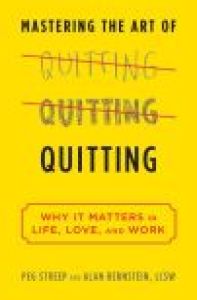
Mastering the Art of Quitting
Why It Matters in Life, Love, and Work
Recommendation
The human brain – which is hard-wired for persistence – and modern culture both disdain a “quitter.” However, the concept that you’ve put in too much work by now to give up can blind you to new possibilities. Peg Streep and Alan Bernstein show you how to push through those mental blocks. They detail how to use “goal mapping” to reinvent yourself, and they explain why “intrinsic goals” built around personal growth yield greater rewards than “extrinsic goals” that depend on the approval of others. The authors cite psychological experiments that explain how your brain predisposes you to persist, even when giving up is a better choice. Readers seeking practical advice will enjoy the book but will draw more insight from interviews with people who quit unfulfilling jobs and tried something new. If you have doubts about whether you’re on the right career or relationship path, getAbstract recommends this dispassionate, convincing guide to knowing when to change course. The authors speak from experience: Each quit a previous career.
Summary
About the Authors
Peg Streep wrote Necessary Journeys in cooperation with Dr. Nancy L. Snyderman. She also has written nine other books. Clinical social worker Alan Bernstein, author of The Princeton Review’s Guide to Your Career, has been a faculty member at New York Medical College and New York University.











Comment on this summary